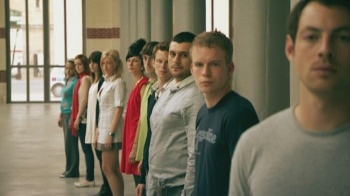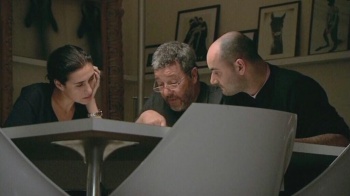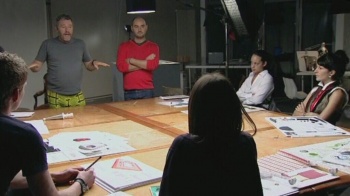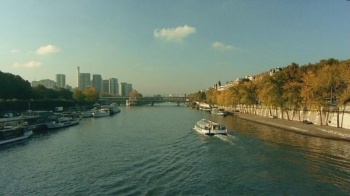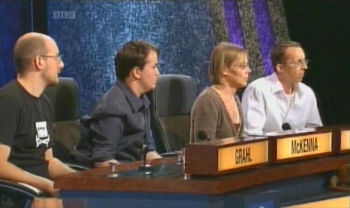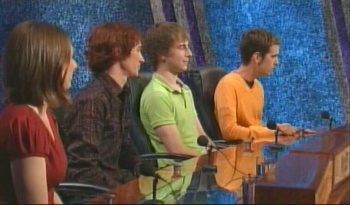Weaver's Week 2009-10-25
m (1 revision) |
UKGameshows (Talk | contribs) |
||
| Line 12: | Line 12: | ||
||<div class=image> | ||<div class=image> | ||
| - | + | [[Image:Design_for_Life_contestants.jpg|350px|Design for Life]] | |
''The contestants standing in a line, for some reason.'' | ''The contestants standing in a line, for some reason.'' | ||
</div> | </div> | ||
| Line 23: | Line 23: | ||
||<div class=image> | ||<div class=image> | ||
| - | + | [[Image:Design_for_Life_Stark_et_al.jpg|350px|Design for Life]] | |
''Virginie, Philippe, and Eugenié.'' | ''Virginie, Philippe, and Eugenié.'' | ||
</div> | </div> | ||
| Line 34: | Line 34: | ||
||<div class=image> | ||<div class=image> | ||
| - | + | [[Image:Design_for_Life_table.jpg|350px|Design for Life]] | |
''Starck's lectures are delivered around a large table.'' | ''Starck's lectures are delivered around a large table.'' | ||
</div> | </div> | ||
| Line 45: | Line 45: | ||
||<div class=image> | ||<div class=image> | ||
| - | + | [[Image:Design_for_Life_paris.jpg|350px|Design for Life]] | |
''The show was made in Paris, and showed it off.'' | ''The show was made in Paris, and showed it off.'' | ||
</div> | </div> | ||
| Line 60: | Line 60: | ||
||<div class=image> | ||<div class=image> | ||
| - | + | [[Image:University_Challenge_2010_UCL.jpg|350px|University Challenge]] | |
''The UCL team.'' | ''The UCL team.'' | ||
</div> | </div> | ||
| Line 73: | Line 73: | ||
||<div class=image> | ||<div class=image> | ||
| - | + | [[Image:University_Challenge_2010_Clare_Cambridge.jpg|350px|University Challenge]] | |
''Clare Cambridge one last time.'' | ''Clare Cambridge one last time.'' | ||
</div> | </div> | ||
|} | |} | ||
| - | <div class= | + | <div class=square> |
[[Image: Square Countdown definition.jpg]] | [[Image: Square Countdown definition.jpg]] | ||
</div> | </div> | ||
Revision as of 14:00, 22 December 2009
Last week | Weaver's Week Index | Next week
Contents |
Design for Life
Two Four for BBC2, Mondays, 14 September – 19 October
| Twelve newly-qualified design students are hand-picked to attend a design school. In Paris. It's a lovely city in the right conditions, and even though this show was recorded during autumn last year, there are plenty of shots of Paris looking lovely. A bit wet, yes, but still lovely. And, as this is a BBC2 programme not an ITV2 show, there are no shots of Paris Hilton. For that small mercy we give thanks.
Anyway, the basic idea is that Philippe Starck (he's always named on screen as Starck, and we shall follow that precedent) is looking for someone to work for him for six months. To find the winner, he'll take a number of candidates, see what they can offer, and pick the best of them. If this sounds like another show, it almost certainly is. There are many differences between Starck and Sugar, not least that Starck knows what he's looking for. His challenges have an obvious function, they clearly build on each other, and he knows precisely what he's looking for. Starck's genius is that he never explains precisely what he's looking for. After a couple of warm-up challenges to weed out the candidates he couldn't work with (including one who gave Starck exactly what he was looking for, and was removed for being too robotic and lacking imagination), Starck gave his Big Plan. He challenged his students to create something in the same vein as his own work: their products were to be ecological, democratic, non-electrical, empowering. Over the next weeks, the students would present first and final drafts, build prototypes, engage in branding, and eventually realise their work. With some of the students falling by the wayside during the process, natch. | |
| Why is this approach such genius? It's a microcosm of the real world. Clients generally don't know what it is they want until they see it. Rather than giving the contestants closed projects that are complete in a few days, Starck's challenge is an open one, and it'll take four programmes (and, we think, six or seven weeks) to play out. Rather than throwing out the previous weeks with the last failed candidate, this show has a clear progression, following a project from initial idea to fruition.
It also tests the candidates to their limits. Starck wants free spirits, people who will not so much think outside the box as refuse to acknowledge anything vaguely boxy in the first place. When first presented with this brief, many of the candidates were completely flummoxed, and floundered around for a week. Only after Starck had threatened to pull the entire project were the designers allowed two more weeks to get their ideas together. Four went to the model-maker, and there was a lesson in punctuality and preparedness as one contestant almost missed his meeting entirely. Two went to prototyping, both assistive technologies – a stick to help people stand up, and a magnetic cutlery and crockery set to aid the blind. As innovative as they are, the designs aren't the star of the show. That honour falls to Philippe Starck, the maverick designer whose works include a toilet brush looking like a sword, a transparent chair, the Eurostar trains, and luxury flats all over the world. With his wife Jasmine and their consigliere Eugené, Starck knows what he wants. At least part of the charm is Starck's French accent, as thick as anything from 80s sitcom 'Allo 'Allo, and still perfectly intelligible. The viewer isn't patronised with subtitles, and the accent brings out a more subtle point of difference to Starck. He's working in the French idiom, a Gallic theory of design clearly different from the British culture in which all the contestants were educated. The contenders need to take what they know from their education and experience, and be prepared to throw bags of it out. The real skill comes in knowing exactly what to retain, and what to question. | |
| Based in Paris, we find it a slight shame that most of the dialogue is conducted in English. How are designers supposed to understand their surroundings if they make no attempt to integrate into them? Or, more likely, are we viewers being denied footage because the BBC assumes we don't understand the most basic French? There is a credit in the annoyingly-squeezed box for "Paris Fixer", and she has surely earned her money. We do wonder if the contestants had an even harder job than it might have seemed. Not only did they have to juggle an ill-defined brief and their own ideas, but they had to do it in a way that looked good on television. Was their creative process defined by the demands of the producers? Did this adversely affect the end results?
Viewers certainly didn't see was Starck's explanation of how his actual designs (expensive and exclusive) squared with his expounded philosophy. What we might have seen through the gaps was how the British system makes it difficult for people to think outside of the box – the only accepted validation in this culture is formal examinations and certification. Good news for teachers, less good for designers. Interspersed in the show are a few vox pops from members of the British Design Council. These talking heads are explaining various terms and concepts that Starck or the contestants use in passing, providing an education for those of us who aren't design professionals. We also see Starck demonstrating his philosophy through the medium of soundbite, which strikes us as a bit limiting. Maybe it would have been possible to introduce him to the audience more fully, perhaps with a brief retrospective of his career. | |
| Starck is a larger-than-life character: he's three-dimensional, in living colour, abrasive, pulls no punches. Many of his potential trainees are recent graduates, nice people, smooth like a pebble, yet coming across as painted in greys and browns. Early on, they're living in a bubble of their own comfort, isolated from Starck and their surroundings. This introduces tension, and the tension builds up to a massive explosion of Starck's pique in episode 3, where he threatens to finish the whole series right there. He's talked out of this idea, and – once the contenders are thinking outside of their comfortable boxes – he gets results.
Ultimately, though, we do think there's something missing from the shows. While there has to be a single winner, we don't see why there had to be such staged removals (two per week) from the competition. For our money, the best parts are those where people are thinking outside the box, where they're pushing the envelope. The producers didn't break much new ground in this show. Speaking to The Independent this week, Starck said that he was unhappy with the way the show was edited. He thinks they could do better. In the producers' defence, design can be an intimidating subject, filled with people who seem to be completely detached from the quotidian world. Wrapping such fare in the familiar trappings of a reality show might well have brought additional people to the show. It's a difficult balancing act, and sometimes there's no right answer. |
University Challenge
Repechage 1: UCL v Clare Cambridge
| UCL lost to Loughborough by 175-205 in the third heat (20 July), Clare Cambridge fell to Jesus Oxford by 165-215 a week later. We confess to not understanding the Wordplay of the Week opener even on a replay, but that's our problem. And UCL's, they pick up a missignal on this first question. The proper Wordplay question is a starter this week, and it's Thumper quoting palindromes at the team. The first visual round is on the Hanseatic League circa 1500, and UCL has a slim lead, 45-35.
There are, of course, only two notable landmarks in Sydney, and it's always dangerous to buzz before the host mentions whether he's on about the one that looks like a coat-hanger. A question has the answer "ABC", described by reference to various parts of various European languages, no-one understands it. Another starter asks (in essence) what is 29 x 17. Now do it in your head! The Clare team pulls back some of its deficit, but then UCL gets a set of bonuses on geometric series, and their PhD Mathematics student gets two right, only missing a tricky summation. The audio round is on Motown covers of songs by The Beatles, and UCL's lead is up to 95-75. Pharmaceutical drugs derived from plants forms a bonus round for UCL, and the first full house of the night. After remaining in touch during the first half, the London side is beginning to open up a lead, thanks to their knowledge of pre-Colombian Americas. The next picture round follows in no time at all – just two sets of bonuses after the audio – and UCL's lead has shot up to 155-75. | |
|
Three more starters should complete the win for UCL, more than the odd bonus would put the bow on it. A full house on the seeds of plants increases the lead past 100, only for Clare to get back in thanks to their intimate knowledge of Welsh counties. A question about DNA was moving from diploid to haploid, Adam Moore guessed well, and that just about wraps up the game for UCL. Though Clare come up well on Italian opera, UCL are equally good on zero-sum games and the top-level domains of European microstates. Clare get the run in the closing moments, but it's all far too late, UCL have won by 220-145. Another good performance from UCL, everyone got at least one starter, Olivia Woolley and Adam Moore took four, and the side recorded 22/36 bonuses and two missignals. For Clare, Matt Cliffe led with six starters, the side was right on 10/29 bonuses, and there was one missignal. The overall accuracy rate was 54/91. Next week: Christ's Cambidge v Emmanuel Cambridge. Our money's on Cambridge. |
Countdown Update
In the last four weeks, Countdown has seen a lot of champions win a few games. Tricia Finn (1 win, 140), George Raison (2 wins, 237), Anthony Pinnell (1, 151), David Kurdynowski (1, 119), and Tony Leverton (1, 153) all took time in the champion's chair. Steve Wood was the month's only octochamp, winning his eight games with a total of 675 points.
Though Steve didn't score a century in his matches, John Drinkwater managed one on his win. He was beaten by Brian Selway, but John's two-game total of 138 is a poor reflection of the quality of his play last Monday – John was good, but Brian Selway was on fire. Two centuries in his first two games, Brian's finished the week undefeated, and will move into the seeded places with a handful of points tomorrow.
The current seeds are:
| Andrew Hulme | 8 wins | 930 pts |
| Chris Davies | 8 | 892 |
| Innis Carson | 8 | 861 |
| Jeffrey Burgin | 8 | 685 |
| Steve Wood | 8 | 675 |
| Jacqueline Baker | 5 | 510 |
| Bob De Caux | 5 | 505 |
| Paul Varlaam | 5 | 483 |
We'll have another update in four weeks, and the finals week looks set to begin on 10 December.
Mastermind
Chas Early will take the Life and Career of Bill Hicks. Hicks (1961-94) was an acerbic stand-up comedian, who spoke with passion and feeling about the American society of the 1980s. The contender recalls many details of Hicks's career, including his appearances with Leno and Letterman, and the inflatable dinosaur he carried with him. As one does. Even with an error, the contender scores a remarkable 18 (0).
John Cooper discusses George Frideric Handel. Handel (1685-1759) was a composer who moved from Halle to Hamburg to London, where he was the court composer for George II. His best-known work is Handel's "Messiah", and contestants on 3-2-1 are expected to know his handle. The contender picks up many correct answers, and reminds us of how The Search used his Sarabande during the chalice-passing bits. Another long round, during which the contender scores 16 (1).
Julie Duff strides confidently to the chair, she'll be telling us about the Mont Blanc Massif. Mont Blanc (4807m) is the tallest peak in the Alps, near Chamonix. It also gives its name to a large sweet pancake, a fact omitted from this round. The contender has had the good fortune to be on top of the mountain with very little company. There are many names in French and Italian in this round, perhaps slowing the quizmaster from his earlier high speeds. Still, 10 (0) is not a bad score.
Evan Williams concludes the first round, with the Life and Works of Isaiah Berlin. Berlin (1909-97) was a philosopher, political thinker, and essayist. He's best known for his essay "Two Concepts of Liberty", suggesting that different standards might apply in different fields. It's a difficult subject at the best of times, and after the contender gets the first question wrong, then passes on a few questions, we find ourselves in something of a pass spiral. 3 (10) is the score we must put on the record.
Evan Williams kicks off his general knowledge round with a Melton Mowbray pork pie, and his other highlights include potassium's other name and the river Seine. His final score is 11 (14).
Julie Duff knows of the derivation of the pterodactyl's name and the adjective pertaining to the kidney. The questions don't fall as kindly as they might, and she ends on 20 (2).
John Cooper needs five to lead, eleven to be reasonably sure of coming back. He kicks off with Epsom and the kindergarten, and the manager of Swallow's Bank. Don't tell him your name, Mainwaring! Was our host on Ye Todaye Programm when he had to interview Whigs? Other than Terry Wogan, natch. 29 (3) is the final score. We'll see Mr. Cooper again!
The repechage:
- John Cooper 29 (3)
- Ian Scott Massie 26 (2)
- Les Morrell 26 (3)
- Colin Wilson 25 (0)
- William de Ath 25 (4)
- Vishal Dalal 23 (4)
But will Chas Early take the night's victory? Twelve to win, seven should suffice for the repechage, and he begins with a wheelie and some sugar substitutes, before remembering John Straw's job in the students' union. The Hidden Transmission Indicator of Last Week is a note about a Brazilian grand prix driver, reminding us to watch the race, er, last weekend. Gymnastics got in the way. It takes time to reach the score, but the contender reaches 29 with no passes, and that's where he stays.
By a gnat's crochet, Mr. Early has won the game. If Mr. Cooper doesn't return, we'll eat our hat.
This Week And Next
Ratings for the week to 11 October gave the advantage to Simon Cowell Annoys – 13.8m saw the result, 12.65m the performances. Strictly combines both shows into one, 8.8m viewers there. Family Fortunes had 6.35m, its best of the year, Millionaire 3.4m, and Masterchef The Professionals 3.25m. UC and Mastermind continue to hold up well – 3.1m and 2.25m respectively, and Buzzcocks has a new year's-best figure, 2.2m.
On the digital channels, ITV2's More Annoyance had 1.505m viewers on Sunday, 1.465m on Saturday. Come Dine With Me took 1.28m on More4. Hell's Kitchen Us attracted a UK record 515,000 to ITV2, Britain's Next Top Model Us a record 470,000 on Living, level with Mock the Week on Dave.
Next week's Week continues our review of the decade by looking at the self-contained universe of reality shows. Before then, food fans will be pleased to learn that BBC2 has new shows, Restaurant In Your Home (8.30 Monday) and The Restaurant (8pm Thursday), while Family Supercooks comes to UKTV Good Food (9pm Monday). Channel 5 fans – there must be some out there – will be pleased to hear of new show Britain's Best Brain (8pm Wednesday) and the return of The What in the World? Quiz (Friday 7.30). Pen Campau is also back, with a catch-up on last year's winners (S4C, 6.30 Wednesday) and The Apprentice Us arrives on these shores a mere four years after the fact (BBC1, 11.20 Monday night). Your reality show times for Hallowe'en night: Strictly 6.50 – 8.45 (guests: The Bee Gees), Simon Cowell 8 – 9.45 (guests: Bon Jovi).

